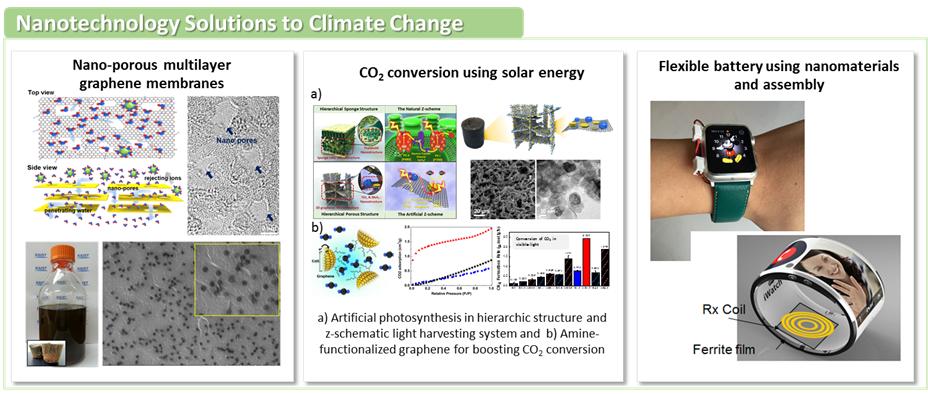
NT for Climate Change
Climate change is an urgent global problem that needs to be addressed and requires immediate attention. Carbon dioxide emissions appear to be a direct cause of climate change due to the major global dependence on fossil fuels for transportation and electricity production, but the impact of climate change goes far beyond the climate itself – it can cause energy crises and water and food shortages, etc. Unfortunately, the reduction of carbon emissions alone cannot solve these global problems caused by climate change, so to respond to this issue of climate change properly, many disciplines must work together without boundaries. Nanotechnology is indeed a central part of many ongoing research and developments aimed at circumventing these problems.

- Nanotechnology for Water and Solar Energy
Conventional water desalination technologies such as reverse osmosis requires significant energy consumption, prompting a pressing need for new materials and systems that are energy-efficient and sustainable, for which nanotechnology (NT) plays a core role. In NT for Climate Change, we are also actively developing innovative materials for the high efficiency solar cell technologies as part of sustainable future energy sources. - Nanotechnology for Advanced Battery
Nanomaterials and their assembly can incorporate future active materials into rechargeable batteries. Once smart nanomaterial designs are integrated, in particular, high capacity materials, such as silicon, lithium, and sulfur can increase the energy densities of batteries significantly so that they can play a key role in extending driving mileage of electric vehicles. Nanomaterials can also be adopted for flexible and wearable batteries that will play as power sources of various future wearable IT devices. - Efficient Processes for CO2 Capture & Conversion
The concentration of atmospheric CO2 reached 400 ppm at 2015 due to continuous increase in global energy demand, causing unexpected climate change. Therefore, the capture, conversion and utilization of undesired CO2 is the most important issue confronting global warming. Nanotechnology breakthrough provides opportunities to develop efficient CO2 capture and conversion system using solar and electrical energy where innovative ideas would bring the possibility to tackle climate change.
- Porous materials for carbon dioxide capture materials
- Heterogeneous catalysis for carbon dioxide reduction and utilization
- Catalysis for environmental hazards
- Post-lithium next-generation batteries
- Two-dimensional ultimate membrane materials for water treatment and desalination
- Hydrogen generation and storage
- Solar power technology
- Large-scale materials informatics and simulations


